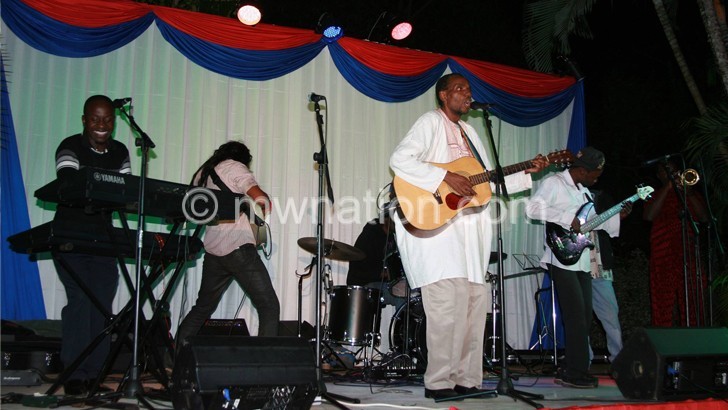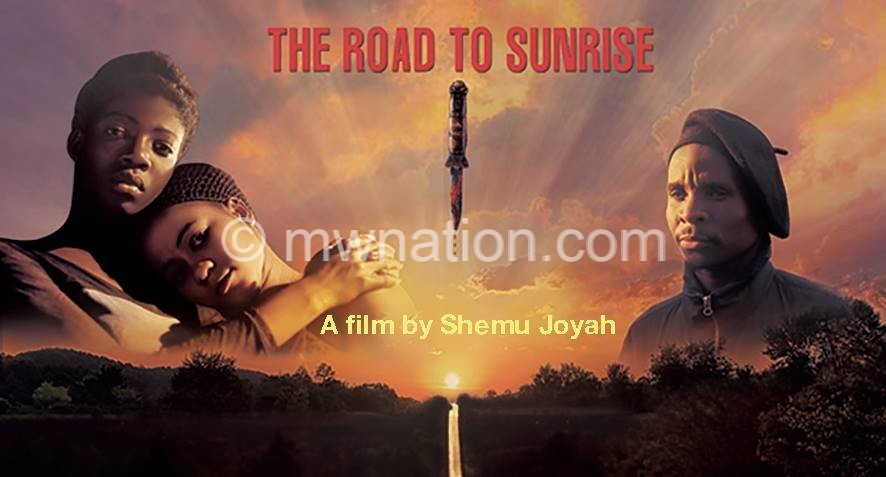Waliko’s touching strings
It is now becoming a tradition at the HS Winehouse to host shows that range from poetry recitals, and theatre performances to music.
The place that lies deep into the bowels of Blantyre’s admired suburb of Namiwawa is poised to steal the glory of other venues that have hosted such entertainment events for many years in the city.

Impressive performance: Waliko and his band at HS Winehouse“We want this place to be synonymous with top-class shows that will entertain the people of Blantyre and beyond,” declared Nkhwachi Mhango, on behalf of the organisers of events at HS Winehouse.
True to his word, the venue has hosted such shows as the spoken word poetry, plays by Mzuzu Theatre Arts Group (Mutag) and some musicians. And today it is Waliko Makhala’s turn to perfom his famous bush music.
On the previous occasion when Mutag staged their plays Tales of a Migrant and Sizwe Bansi is Dead,’ some people from Mzuzu City in the North would travel with the group to Blantyre to watch the performances at HS Winehouse This speaks for itself the pull that these shows are having on people.
Before Waliko and his band took to the stage, HS Winehouse owner Wilkins Mijiga welcomed the audience to another treat of entertainment.
The audience itself is impatient to hear the sound of Waliko’s guitar. It is with a defeaning applause that the band is welcomed on that stage. Five men carry a guitar, violin, trumpet, drum and an accordion ready to mesmerise the audience for the next two hours or so.
As the time strikes 7:05pm, the Music Club, for that is the name of the band, give the audience as sample of the instrumentation. It is quickly felt by all as they nod their heads to the rhrthm of the musical instruments.
Just across the stage, some damsels are dressed in white, ready to introduce a surprise as the show is in progress.
Then Waliko grabs the microsphere to the delight of the audience and speaks humorous thus: “We are going to engage ourselves in a conversation of music. We, the artists, will take you [audience] on a musical journey from Chitipa to Nsanje. I will particularly sing a song for you of one million years old. This song of mine beats Charles Darwin’s theory of evolution. This music is ancient and primitive. It was there before the ancient civilisation of Egypt.”
At this stage, the audience is sent into stitches of laughter. Everyone gathered here seems to enjoy every bit of this bush music by Waliko.
Then he adjusts himself before the microphone, making sure the guitar strapped on his chest is positioned in a way that the sound escaping from its tiny strings should be captured by the microphone .
As his fingers pluck the strings skillfully, a note is struck in people’s minds and its melody like ripples of joy echoes in their hearts. The transfixed audience then hears Waliko sing “kuyenda kwa a Malawi/amayenda pang’ono pang’ono….’ It is a simple song but it veils a message whose import is to criticise a laisez fair attitude of doing things.
Malawians have been criticised by some international observers of being slow in almost every aspect of life. There have been reports that Malawians are slow walkers in the world. Anyway, these are just biased opinions from the West, perhaps, but Waliko says “kuyenda kwa a Malawi mkwa pang’ono pang’ono”
Things get even better as the people anticipated. It is particulary when he performs Zapadziko by legendary musician Stonald Lungu that the audience sings along.
The art of music as he strikes the strings of the guitar, the streaming sound of the trumpent and murmuring sound of the accordion mingle to produce a soothing melody.
Waliko then grabs the mic again to make an announcement.
“I will sing a song which I am dedicating to Chief Kawinga on his elevation to Paramount Chief,” he says.
And in no time he starts singing so passionately, as if possesed by the ancenstors whom he is glorfying now.
Then from the blues comes Mijiga who announces his sister’ is celebrating a birthday on this very day the bush music is being perfomed.
“It is with utmost joy that I present to the audience my sister, one great diva in Malawi,” Mijiga says to the wild cheers from the audience.
A group of damsels dressed in white emerges from one of the rooms, flanking the diva onto the stage, to dance to the rhythm of bush music –the ancenstors had done her a great favour to have her birthday fall on a day they would be honoured by Waliko’s song renditions.
On a night full of turns and twists, Mijiga calls a lady from the thicket of the audience to come to the stage and perform again, Stonald Lungu’s Zapadziko.
She stands behind the mic, facing the audience and slowly but skillfully, crafts out a melodious voice that resonates across and for a moment like one is hypnotised by an epiphany of glory, the audience’s hush erupts in a chorus of singing: “Zapadziko…mzachabe chabe…” It is a spirited performance by a woman who until her borrowed time on stage, lay in obscurity.
The spectacle of the diva dancing with a man on the centre of the stage is too captivating to go without applause from people.
“This is what we call entertainment,” exclaims one lady who is having quality time.
Waliko’s touching strings at HS Winehouse have provided the long forgotten moments of enjoyment to some Blantyre fans and as he says goodbye so are the people nodding their heads in happiness.n





